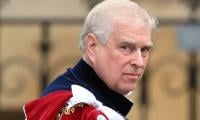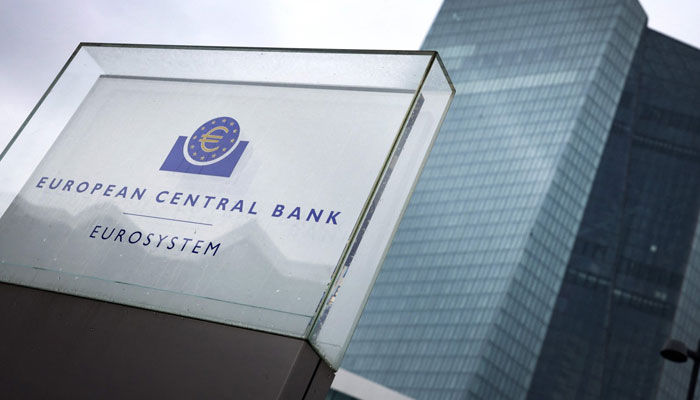Eurozone inflation falls more than expected to 2.4pc
FRANKFURT: Inflation in the eurozone has fallen far more than expected to 2.4 percent in November, the slowest annual pace since July 2021, providing some relief to consumers and fuelling hopes that interest rates could soon be cut.
The sharp drop from 2.9 per cent a month earlier adds to tensions between investors who hope rates will be cut soon and central bankers seeking to keep borrowing costs high until the biggest surge in inflation for a generation has been definitively tamed.
Falling energy prices and lower growth in food and services prices were the main factors behind the slowdown in the harmonised index of consumer prices, according to data published on Thursday by Eurostat, the EU’s statistics arm.
Economists polled by Reuters had expected a more modest slowdown to 2.7 per cent. The drop in inflation has prompted investors to bring forward their bets of when the European Central Bank could start cutting its deposit rate to as early as next April.
“Falling inflation and a stagnant economy could justify ECB cuts as soon as the first quarter of next year in our view,” said Matthew Landon, a strategist at JPMorgan Private Bank. “It is looking more and more likely that Lagarde and co could lead the developed world into the next cutting cycle.”
The euro extended its recent losses, falling 0.6 per cent against the US dollar to $1.091. However, ECB president Christine Lagarde warned this week it was “not the time to start declaring victory” in the push to bring inflation down to the bank’s 2 per cent target. The ECB chief added that wage pressures “remain strong” and had become “a key factor driving domestic inflation”.
The ECB will meet on December 14, when economists expect it to cut its forecasts for growth and inflation. But Andrew Kenningham, an economist at consultancy Capital Economics, said rate-setters are “sure” to say it is still “far too early to cut rates”, especially as higher energy prices were likely to drive eurozone inflation back above 3 per cent in December.
The slowdown in eurozone price growth from its peak of 10.6 per cent a year ago is expected to offer a further boost to consumers’ purchasing power, as wages rise faster than prices. However, the cost of living remains almost 20 per cent higher than before the inflation surge started three years ago.
Fabio Panetta said in his first speech since leaving the ECB to become Italy’s central bank governor that “continued weakness in economic activity” could accelerate the fall in inflation and mean monetary policy needs to remain tight for only a “short” period.
“We need to avoid unnecessary damage to economic activity and risks to financial stability, which would ultimately jeopardise price stability,” Panetta said. He also pushed back against calls by other ECB rate-setters to speed up the shrinkage of its balance sheet by stopping reinvestments in a €1.7tn pandemic-era portfolio of bonds earlier than planned.
While Lagarde said on Monday that price pressures are expected to ease further, she added that “headline inflation may rise again slightly in the coming months, mainly owing to some base effects” — a reference to an expected levelling off of energy prices.
The OECD also forecast on Wednesday that the ECB would not start cutting rates until 2025 because of persistent price pressures. Inflation within the eurozone still ranges widely, from 6.9 per cent in Slovakia to minus 0.7 per cent in Belgium for the year to November. Five of the 20 countries that share the euro have inflation below the ECB’s 2 per cent target, including Italy and the Netherlands.
Energy prices in the bloc fell at close to a record rate of 11.5 per cent in October. Growth in the prices of food, alcohol and tobacco slowed to 6.9 per cent, decelerating from 7.4 per cent a month earlier and a peak of 15.5 per cent earlier this year.
Core inflation, which excludes energy and food, slowed to 3.6 per cent, down from 4.2 per cent in October. This metric is closely watched by the ECB as a gauge of underlying price pressures.
Unemployment remained at a record low of 6.5 per cent across the bloc in October, according to separate figures published on Thursday. However, the jobless rate increased in both Germany and Italy.
The rapid inflation slowdown puts the euro zone central bank and investors on a collision course as the two appear to see greatly different paths ahead, both for consumer prices and ECB interest rates.
"With a third month of an unambiguously good inflation report, and with prices actually declining from the previous month, it is starting to look that before long we will be talking about inflation being too low, rather than too high," Kamil Kovar, a senior economist at Moody's Analytics, said.
"And if the recent trends in inflation and growth continue then 2024 will be the year when the ECB implements a pirouette in monetary policy." Bank of Italy Governor Fabio Panetta did not explicitly push back on the ECB's guidance on Thursday but warned about the dangers of keeping interest rates high for too long.
"The duration of this phase will depend on development in macroeconomic variables; it could be short if continued weakness in economic activity accelerates the decline in inflation," Panetta, a former ECB board member, said. ""We need to avoid unnecessary damage to economic activity."
Investors are increasingly ignoring ECB President Christine Lagarde's explicit guidance for steady rates for several quarters, pricing in a combined 115 basis points of cuts for the next year, with a first move by April fully priced in.
A key reason for the discrepancy is that the ECB's own projections have a poor track record. It has been forced several times in recent years to abandon its guidance after first pushing back on market expectations.
Economists say that growth is weaker than the ECB expected, the labour market is softening and credit demand has evaporated, all pointing to rapid disinflation.
"Also, there is still a lot more of the impact of tightening to come as interest payments are still increasing," ING economist Bert Colijn said. "The market is therefore right to start looking at rate cuts for 2024. We think the first one could well happen before the summer."
Some economists argue that modelling current inflation is exceptionally difficult because corporate profits are the main driver, not wages as in normal bouts of rapid inflation.
-
 Demi Lovato Leaves Fans Disappointed With Unexpected Announcement
Demi Lovato Leaves Fans Disappointed With Unexpected Announcement -
 Pacers Vs Knicks Overtime Thriller Ends In Heartbreak For New York
Pacers Vs Knicks Overtime Thriller Ends In Heartbreak For New York -
 Who Owns The Ambassador Bridge? New Report Links Owner Matthew Moroun To Trump’s Threat
Who Owns The Ambassador Bridge? New Report Links Owner Matthew Moroun To Trump’s Threat -
 ICE Detention Center Plan Sparks Controversy In Maryland As Lawmakers Push Back
ICE Detention Center Plan Sparks Controversy In Maryland As Lawmakers Push Back -
 Blood Pressure Medication Recalled After Wrong Tablets Found In Bottles
Blood Pressure Medication Recalled After Wrong Tablets Found In Bottles -
 Why Ariana Grande Wants A 'tiny Mouse' To Play Her In Biopic?
Why Ariana Grande Wants A 'tiny Mouse' To Play Her In Biopic? -
 Wind Chill Returns With Brutal Cold As Polar Vortex Stalls Over Canada
Wind Chill Returns With Brutal Cold As Polar Vortex Stalls Over Canada -
 Princess Beatrice, Eugenie ‘do Not Want To Be Seen In Public’ Because Of Dad
Princess Beatrice, Eugenie ‘do Not Want To Be Seen In Public’ Because Of Dad -
 Costco $20 Rule Explained As Employee Pay Climbs Across North America
Costco $20 Rule Explained As Employee Pay Climbs Across North America -
 Strange Incident Happened At Nancy Guthrie's Home On Abduction's 10th Day
Strange Incident Happened At Nancy Guthrie's Home On Abduction's 10th Day -
 Tumbler Ridge School Lockdown Underway As RCMP Investigate School Shooting
Tumbler Ridge School Lockdown Underway As RCMP Investigate School Shooting -
 Royal Family Knows There Can Be ‘no More Glossing’ Of Andrew Downfall
Royal Family Knows There Can Be ‘no More Glossing’ Of Andrew Downfall -
 Britney Spears Quietly Parts Ways With Her Music Catalog: Report
Britney Spears Quietly Parts Ways With Her Music Catalog: Report -
 Princess Diana Bodyguard Suspected ‘she Could Die’: Here’s How
Princess Diana Bodyguard Suspected ‘she Could Die’: Here’s How -
 Teddi Mellencamp Marks Huge Milestone With Emotional Message Amid Cancer
Teddi Mellencamp Marks Huge Milestone With Emotional Message Amid Cancer -
 Shamed Andrew To ‘kiss And Tell’ After Dip In Popularity
Shamed Andrew To ‘kiss And Tell’ After Dip In Popularity




